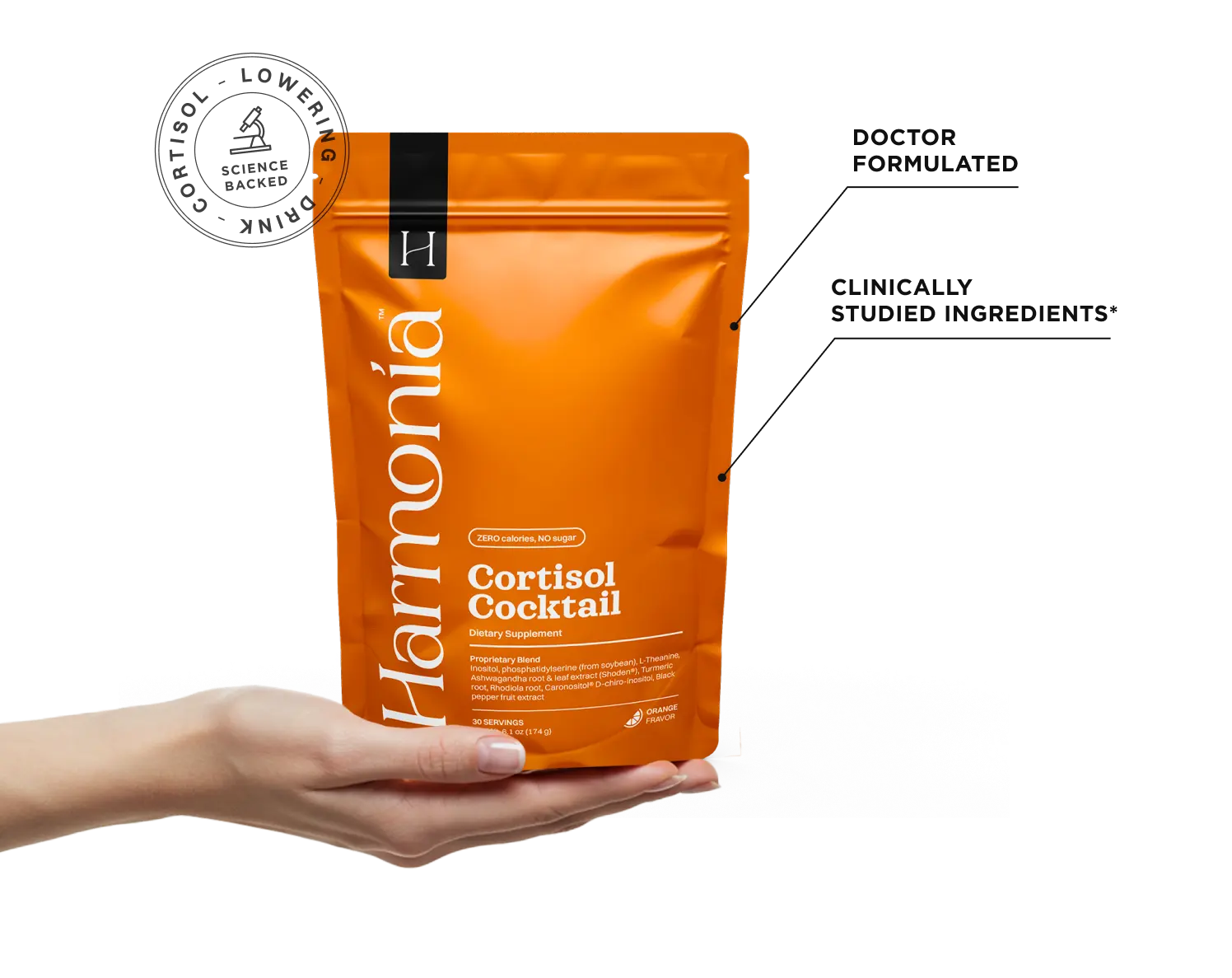Polycystic Ovary Syndrome (PCOS) affects an estimated 6–13% of reproductive-aged women worldwide - but what many don’t realize is how closely this condition is tied to stress and hormone imbalance.
When your body stays in “fight-or-flight” mode due to chronic stress, cortisol levels rise, disrupting the delicate balance of reproductive hormones like estrogen, progesterone, and testosterone.
That’s where adaptogens come in - a class of herbs known for helping the body adapt to stress. One of the most researched and effective adaptogens is ashwagandha. Used in Ayurvedic medicine for centuries, ashwagandha is now gaining attention for its potential to help women with PCOS regulate stress, improve mood, and restore hormonal balance.
Here, we’ll explore the science behind ashwagandha for PCOS and how it may benefit your hormone health.
What Is Ashwagandha and How Does It Work?
Ashwagandha (Withania somnifera) is an ancient adaptogenic herb known for helping the body maintain equilibrium during times of stress. Its name literally means “strength of the horse” - a reference to its rejuvenating and stabilizing effects on energy and vitality.
From a scientific perspective, ashwagandha helps modulate the hypothalamic-pituitary-adrenal (HPA) axis, which governs the body’s stress response. When cortisol (the stress hormone) stays high for too long, it can lead to fatigue, anxiety, and hormonal chaos. Ashwagandha helps lower cortisol levels naturally, promoting relaxation and supporting adrenal balance.
But the benefits don’t stop there - emerging research also suggests a link between ashwagandha and testosterone regulation. Some studies show that ashwagandha can support more balanced androgen levels, which is important because women with PCOS often have elevated testosterone. This hormonal harmony may translate into fewer breakouts, improved mood, and more regular cycles.
The Connection Between Ashwagandha and PCOS

PCOS is a multifactorial condition - driven by a combination of genetic, metabolic, and stress-related triggers. One of the most overlooked aspects of PCOS is chronic stress, which elevates cortisol and worsens symptoms like weight gain, anxiety, fatigue, and irregular periods.
Recent ashwagandha PCOS studies show promising outcomes. In one clinical trial, women who were supplemented with ashwagandha experienced significant reductions in cortisol and anxiety levels, along with improved reproductive hormone balance.
These effects are especially relevant for PCOS, where lowering cortisol can indirectly help regulate insulin, progesterone, and androgen levels.
Ashwagandha’s adaptogenic power lies in its ability to help the body recalibrate — reducing both the emotional and physical burden of stress. By calming the nervous system, it helps improve sleep, stabilize mood, and even support more predictable menstrual cycles.
Top Benefits of Ashwagandha for Women With PCOS
Living with PCOS often means managing a mix of symptoms - from fatigue and mood swings to irregular cycles and stubborn weight changes. Many of these challenges stem from hormonal imbalances driven by chronic stress and elevated cortisol levels.
That’s where ashwagandha can make a real difference. As a natural adaptogen, it helps the body adapt to physical and emotional stressors, working to restore balance across the entire hormonal system.
Rather than masking symptoms, ashwagandha addresses the root causes of imbalance by supporting adrenal health, improving mood regulation, and calming the stress response.
Here are some of the most well-researched and effective benefits of ashwagandha for women with PCOS:
1. Supports Hormonal Balance
Hormonal irregularities are one of the defining features of PCOS, and stress only amplifies them. When cortisol levels stay high, they can interfere with the production of progesterone and upset the delicate balance of estrogen and testosterone.
Ashwagandha helps bring cortisol and reproductive hormones back into alignment. By easing the strain on the adrenal glands, it allows your endocrine system to function more efficiently, which can lead to more regular menstrual cycles and a healthier hormonal rhythm overall.
Over time, many women notice improvements in ovulation, energy levels, and PMS symptoms as their hormones stabilize.
2. Reduces Stress and Cortisol Levels
High cortisol levels can disrupt nearly every system in the body, contributing to anxiety, mood swings, irregular cycles, and even weight gain. Chronic stress also worsens inflammation and sleep quality - both major triggers for PCOS symptoms.
Ashwagandha helps regulate the body’s stress response by supporting the hypothalamic-pituitary-adrenal (HPA) axis. This allows cortisol levels to stabilize naturally, promoting a calmer mind, fewer emotional ups and downs, and better focus.
For women who often feel mentally overwhelmed or emotionally reactive, using ashwagandha consistently can lead to a noticeable sense of balance and relief.
3. Improves Insulin Sensitivity
Insulin resistance affects a large percentage of women with PCOS and plays a key role in symptoms such as weight gain, cravings, fatigue, and acne.
When cells become less responsive to insulin, blood sugar levels rise, which can trigger excess androgen (testosterone) production and worsen hormonal imbalances.
Ashwagandha has been shown to help improve glucose metabolism and enhance insulin sensitivity. By helping regulate blood sugar and energy levels, it supports more balanced hormones and reduces the spikes and crashes that can lead to cravings and irritability.
When paired with other nutrients like Myo-Inositol and D-Chiro Inositol, the benefits for metabolic and hormonal health can be even greater.
4. Promotes Better Sleep and Emotional Resilience

Sleep and hormone balance are deeply connected. Poor sleep increases cortisol, affects appetite-regulating hormones, and makes it harder for the body to recover. Women with PCOS often struggle with insomnia or restless sleep, especially when stress levels are high.
Ashwagandha promotes relaxation and helps regulate nighttime cortisol, allowing for deeper, more restorative rest. Better sleep supports overall hormone balance and contributes to greater emotional resilience.
Many women find that after adding ashwagandha to their routine, they fall asleep faster, wake up more refreshed, and handle daily stress with more ease.
5. Enhances Mood and Cognitive Function
PCOS can take a toll on mental well-being. Many women report increased anxiety, irritability, and brain fog, often linked to cortisol dysregulation and inflammation.
Ashwagandha supports neurotransmitters like serotonin, GABA, and dopamine - chemicals that help maintain a stable mood and improve focus. By nourishing the brain and calming the nervous system, it can promote a clearer mind, better concentration, and a brighter outlook.
Women who take ashwagandha regularly often describe feeling more grounded, emotionally steady, and in control of their mood and mindset.
Can Ashwagandha Cause Side Effects? What to Watch Out For
Ashwagandha is generally considered safe and well-tolerated, but as with any supplement that influences hormones and stress response, individual reactions can vary - especially for women with PCOS or other endocrine conditions.
In most studies, ashwagandha has been shown to support hormone balance rather than disrupt it. However, mild side effects such as digestive discomfort, drowsiness, or changes in menstrual flow can occasionally occur, particularly when starting at higher doses.
While some women notice subtle shifts in their cycles at first, these changes are usually temporary and often reflect the body’s adjustment toward better hormonal regulation.
Concerns about mood changes or increased anxiety are uncommon. In fact, most evidence points to ashwagandha’s calming effects, with studies showing significant reductions in stress, anxiety, and irritability.
Similarly, it is not known to cause acne; by lowering cortisol and inflammation, it may actually improve skin clarity over time.
To minimize side effects and maximize results, it’s best to:
- Choose a high-quality, clinically studied extract, such as the one used in Harmonia.
- Start with a moderate dose and gradually increase as tolerated.
- Take it consistently for several weeks to allow your body to adjust.
When used mindfully, ashwagandha can be a powerful and safe ally for hormonal balance, stress reduction, and overall well-being.
Who Should Avoid Ashwagandha?
Although ashwagandha is a natural and well-researched herb, it isn’t suitable for everyone. Certain individuals should use caution or seek medical advice before adding it to their routine.
You should avoid or consult your healthcare provider before using ashwagandha if you:
- Are pregnant or breastfeeding. High doses of ashwagandha may stimulate uterine activity or affect hormone levels, making it best avoided during pregnancy and lactation.
- Have thyroid or autoimmune conditions. Because ashwagandha can influence thyroid hormone production and immune response, individuals with these conditions should use it only under medical supervision.
- Take prescription medications. Those using hormone-regulating, diabetic, blood pressure, or sedative medications should check with their doctor to prevent potential interactions.
For most healthy adults, ashwagandha is safe and beneficial when used appropriately. The key is to start with a moderate dose, monitor how your body responds, and choose a high-quality, clinically tested formula for optimal safety and effectiveness.
How Harmonia Combines Ashwagandha With Other PCOS-Supportive Ingredients

If you’re looking for an easy way to experience the benefits of ashwagandha without juggling multiple supplements, Harmonia offers a simple, science-backed solution.
Harmonia’s Cortisol Blend is a smart adaptogenic formula created to help women lower stress, rebalance hormones, and improve energy naturally. Each ingredient works synergistically to target key issues linked to PCOS and high cortisol:
- Ashwagandha: Calms the nervous system, lowers cortisol, and supports balanced hormones.
- Myo-Inositol & D-Chiro Inositol: Help regulate insulin and menstrual cycles.
- L-Theanine & Rhodiola Rosea: Boost mental clarity, reduce anxiety, and curb emotional eating.
- Turmeric & Phosphatidylserine: Support inflammation balance and brain health.
- Black Pepper Extract: Enhances absorption of nutrients for maximum benefit.
Clinically Supported Benefits
- 91% of women felt less anxious and more emotionally balanced.
- 68% experienced improved hormonal balance related to PCOS and menstrual cycles.
- 95% reported higher energy levels and more restful sleep.
Harmonia makes hormone and stress support simple - one delicious, plant-based drink per day, zero sugar, and results you can feel.
Final Thoughts
PCOS can feel overwhelming - but supporting your hormones doesn’t have to be complicated. Ashwagandha for PCOS offers a natural way to bring your body back into balance by lowering cortisol, supporting emotional well-being, and promoting healthier cycles.
When combined with other adaptogens and nutrients, as in Harmonia’s Cortisol Blend, ashwagandha becomes part of a comprehensive solution for women who want to feel calmer, more energized, and hormonally aligned.
It’s time to put stress in its place - and help your hormones thrive again.
Take the Harmonia Quiz to find your personalized hormone support blend, or Shop Harmonia today to start your wellness journey.
References
- Albalawi, A. A. (2025). Dual impact of Ashwagandha: Significant cortisol reduction but no effects on perceived stress–A systematic review and meta-analysis. Nutrition and Health, 02601060251363647. Link.
- Majeed, M., Nagabhushanam, K., & Mundkur, L. (2023). A standardized Ashwagandha root extract alleviates stress, anxiety, and improves quality of life in healthy adults by modulating stress hormones: Results from a randomized, double-blind, placebo-controlled study. Medicine, 102(41), e35521. Link.
- Wiciński, M., Fajkiel-Madajczyk, A., Kurant, Z., Kurant, D., Gryczka, K., Falkowski, M., ... & Zabrzyński, J. (2023). Can ashwagandha benefit the endocrine system?—a review. International journal of molecular sciences, 24(22), 16513. Link
- World Health Organization: WHO & World Health Organization: WHO. (2025). Polycystic ovary syndrome. Link.







